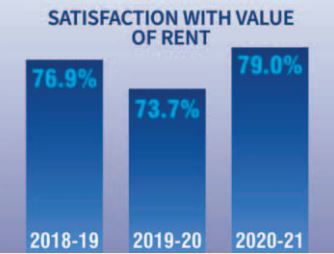Introduction
Covid-19 has changed our entire operating environment and is expected to have long lasting and extensive implications. We have adapted by providing more digital self-service and improved mobile IT resources. During the year there was an increase in those needing more intensive support e.g. with hoarding and high fire safety risk, mental health crises, addiction. Covid appears to have exacerbated the pressures on many people with existing support needs and it has been more challenging to provide support remotely. Such support needs are expected to continue to grow and are very labour-intensive. Domestic Abuse helplines experienced an increase in demand during the year. We have continued to support survivors already known to us however the number of new cases has reduced compared to 2019/20. We are due for DAHA (Domestic Abuse Housing Alliance) re-accreditation and will need to review our practice. The removal of the Universal Credit (UC) uplift of £20 per week from October ’21 and the end of the furlough scheme will further increase financial pressure on households. The Money Matters team and CLAS will remain important resources.
A new Social Housing White Paper is being introduced. The Regulator for Social Housing is setting out a proposed framework for tenant satisfaction measures. The 23 draft measures overlap with much of what we measure now but we will need to update some of our surveys.
STAR Survey Results 2020-21
The results for the whole survey improved since the previous year, and covered the entire first year of the pandemic; many of you seemed to value the support we could provide during this challenging time. We can always learn from the reasons you give for any dissatisfaction, and this provided valuable insight. For example, you confirmed we needed to improve the gardening services, improve our complaints handling and develop more ways of communicating with you e.g. by email.


